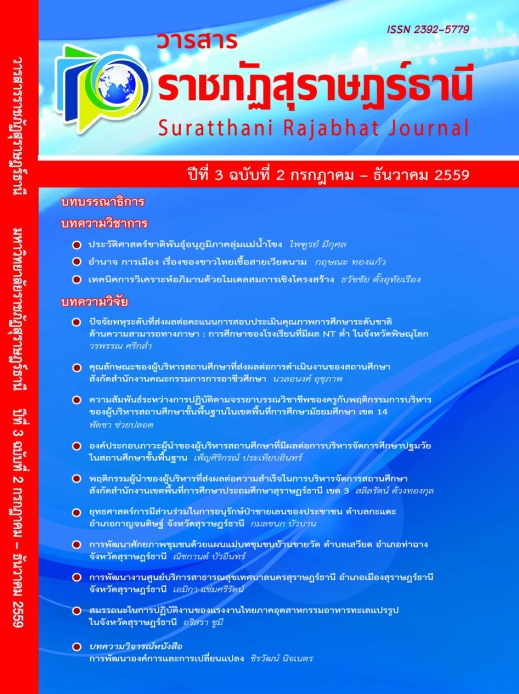Leadership Factor of School Administrators Affecting Early Childhood Education Management in Basic Education Schools
Main Article Content
Abstract
The purposes of this research were to study the components of leadership factors of school administrator affecting the early childhood educational management in Basic Education Schools and to confirm the leadership factors of school administrators affecting the early childhood educational management in Basic Education Schools. There were 2 steps of research operation : 1) to study of the elements of effective leadership from principles, theories, related researches and collecting interview data from 5 experts and 2) to confirm the factors of school administrator affecting the early childhood education management by using exploratory factor analysis: EFA. The data were collected from 174 school directors in Early Childhood Educational of Basic Education Schools; then there was a discussion process by using a focus group discussion with 9 experts.
The research result revealed that: there were 8 major components and 88 significant indicators as the leadership factors of school administrators affecting the early childhood educational management in Basic Education Schools as follows : 1) Visionary Leadership 14 indicators, 2) Ethical Leadership 14 indicators, 3) Professional Leadership 12 indicators, 4) Academic Leadership 12 indicators, 5) Transformational Leadership 10 indicators, 6) Inspiration Leadership 10 indicators, 7) Technological Leadership 8 indicators and 8) Individualized Leadership 8 indicators. In addition, the experts commented that all of those major components were suitable and possible for implementation eventually.
Article Details
References
กัญญ์รัชการย์ นิลวรรณ. (2553). องค์ประกอบภาวะผู้นำทางวิชาการของผู้บริหารสถานศึกษาที่ส่งผลต่อประสิทธิผลการจัดการศึกษา สังกัดสำนักการศึกษากรุงเทพมหานคร. ดุษฎีนิพนธ์ปรัชญาดุษฎีบัณฑิต สาขาบริหารการศึกษา บัณฑิตวิทยาลัย มหาวิทยาลัยบูรพา.
กาญจนา ชุมศรี. (2553). องค์ประกอบภาวะผู้นำการเปลี่ยนแปลงของผู้บริหารที่ส่งผล ต่อประสิทธิภาพ ของโรงเรียนมัธยมศึกษาสังกัดสำนักงานเขตพื้นที่การศึกษากรุงเทพมหานคร. กรุงเทพฯ : มหาวิทยาลัยเกษตรศาสตร์.
กีรติ ยศยิ่งยง (2550). การจัดการความรู้ในองค์การและกรณีศึกษา (พิมพ์ครั้งที่ 2).กรุงเทพฯ : ธรรกมล.
ขวัญใจ ขุนทำนาย. (2554). รายงานการพัฒนาชุดกิจกรรม เรื่อง ยาเสพติด ชั้นมัธยมศึกษาปีที่ 2. (Online) สืบค้นได้จาก : http://www.kroobannok.com/ board_view.php?b_id=57014. [2558, ตุลาคม 8].
จีระ หงส์ลดารมภ์. (2550). การจัดการเรียนรู้. กรุงเทพฯ : ดอกหญ้า.
ชัยเสฏฐ์ พรหมศรี. (2549). สุดยอดผู้บริหาร. กรุงเทพฯ : เอ็กซเปอร์เน็ท.
ธีระ รุญเจริญ.(2553). ความเป็นมืออาชีพในการจัดและบริหารการศึกษา ยุคปฏิรูปการศึกษา (ฉบับปรับปรุง) เพื่อปฏิรูปรอบ 2 และประเมินภายนอกรอบ 3 (พิมพ์ครั้ง 6). กรุงเทพฯ : นวสาส์น.
นงลักษณ์ วิรัชชัย. (2542). โมเดลลิสเรลสถิติวิเคราะห์สำหรับการวิจัย (พิมพ์ครั้งที่ 3).กรุงเทพฯ : โรงพิมพ์แห่งจุฬาลงกรณ์มหาวิทยาลัย.
พวงรัตน์ ทวีรัตน์. (2543). วิธีการวิจัยทางพฤติกรรมศาสตร์และสังคมศาสตร์ (พิมพ์ครั้งที่ 7). กรุงเทพฯ : สำนักทดสอบทางการศึกษาและจิตวิทยา มหาวิทยาลัยศรีนครินทรวิโรฒ.
รังสรรค์ ประเสริฐศรี. (2551). ภาวะผู้นำ (พิมพ์ครั้งที่ 2). กรุงเทพ ฯ : ธีระฟิลม์และไซเท็กซ์.
รัตนะ บัวสนธ์. (2539). รวมบทความทางวิชาการดานการวิจัย สถิติและประเมินผลการศึกษา. พิษณุโลก : คณะศึกษาศาสตร์ มหาวิทยาลัยนเรศวร.
เรขา ศรีวิชัย. (2554). รูปแบบการบริหารงานสถานศึกษาเอกชนระดับปฐมวัยที่มีประสิทธิผลในจังหวัดนนทบุรี. ดุษฎีนิพนธ์ปรัชญาดุษฎีบัณฑิต สาขาวิชาบริหารการศึกษา วิทยาลัยบัณฑิตศึกษาด้านการจัดการ มหาวิทยาลัยศรีปทุม.
ศักดิ์ไทย สุรกิจบวร. (2549). การแสวงหาและแนวทางการพัฒนาภาวะผู้นำของผู้บริหารมืออาชีพ กรณีผู้บริหารการศึกษาและผู้บริหารสถานศึกษา. กรุงเทพฯ : สุวีริยาสาส์น.
สำนักงานคณะกรรมการการศึกษาขั้นพื้นฐาน. (2548). แนวดำเนินงานโรงเรียน ศูนย์เด็กปฐมวัยต้นแบบ. กรุงเทพฯ : โรงพิมพ์องค์การรับส่งสินค้าและพัสดุภัณฑ์.
สำนักงานคณะกรรมการการศึกษาขั้นพื้นฐาน. (2556). แนวทางการประเมินคุณภาพ ตามมาตรฐานการศึกษาปฐมวัยเพื่อการประกันคุณภาพภายในสถานศึกษา. กรุงเทพฯ : โรงพิมพ์ชุมนุมสหกรณ์การเกษตรแห่งประเทศไทย.
สุภาวดี นพรุจจินดา. (2553). องค์ประกอบภาวะผู้นำของผู้บริหารวิทยาลัยพยาบาล สังกัดกระทรวงสาธารณสุข. ดุษฎีนิพนธ์ปรัชญาดุษฎีบัณฑิต สาขาวิชาการบริหารการศึกษา บัณฑิตวิทยาลัย มหาวิทยาลัยศิลปากร.
Chatfiled, C. A. & C. J. (1980). Introduction to Multivariate Analysis. London and New York : Chapman & Hal.
Clive, D. & Walker, A. (2005). Educational Leadership : Culture and Diversity. London : SAGE Publication.
Covey, S. R. (1989). The Seven Habits of Highly Effective People. London : Simon and Schuster.
Cronbach, L. (1990). Essentials of Psychological Testing. New York : Harper & Row.
Daft, R. L., & Lane, P. G. (2008). The Leadership Experience (5thed.). Mason OH : South Western Cengage Learning.
Fisher, C.D. (1993). Boredom at work : A neglected concept. Human Relations, 46 : 395 - 417.
Gordon, A., & Browne, K.W. (1993). Beginnings and Beyond. New York : Delmar Publishers.
Hoy, A. W., & Hoy, W. K. (2013). Instructional Leadership: A research-based guide to learning in schools (4thed). Boston : Allyn and Bacon.
Kerlinger, F. N. (1977). The influence of research on educational practices. Educational Researcher, 6(8) : 5 - 12.
Little, J. W. (1993). Teacher Professional Development in a Climate of Educational Reform. Educational Evaluation and Policy Analysis, 15 : 129 - 151.
McChokle C. O. & others. (1982). Management and Leadership in Higher Education. San Francisco : Jossey – Bass.
Murphy, J. (1997). Putting new school leaders to the lest. Education Week, 2(11) : 24 - 26.
Northouse, P. G. (2010). Leadership:Theoryand Practice (5th ed). London : ECIY
Robert F. R. (2001). The role of values in servant leadership. Leadership & Organization Development Journal, 22(2) : 76 – 84.
Rue, L.W. & Byars, L.L. (2007). Management: Skills and Application (12thed). New York : McGraw-Hill.


